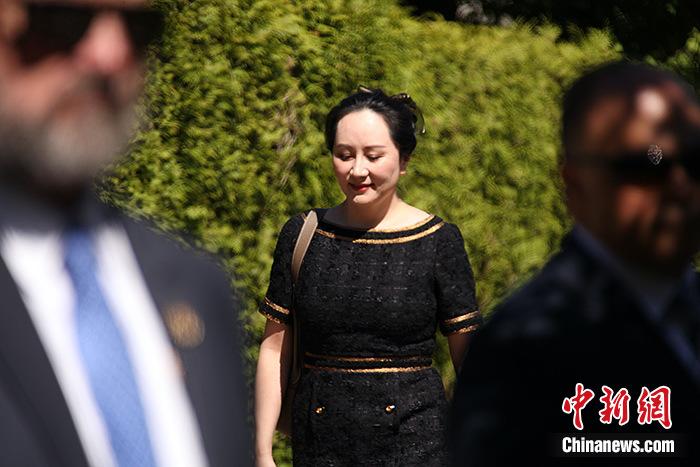China News Service, Toronto, April 1st (Reporter Yu Ruidong) The fourth branch of the Meng Wanzhou extradition case concerning "procedural abuse", namely whether the US extradition request violates customary international law, was held on April 1st after three and a half days. The Supreme Court of British Columbia, Canada ended in Vancouver.
Starting in late April, the case will enter the final stage of the trial before the trial judge makes the first extradition judgment.
Data map: On May 27, 2020 local time, Meng Wanzhou walked out of his residence in Vancouver, Canada, and went to the court to hear the ruling.
Photo by China News Agency reporter Yu Ruidong
During this trial, Meng Wanzhou’s defense lawyer stated that the United States’ request for extradition against Meng violated international law.
In the allegations made by the United States regarding Meng's conduct in Hong Kong and HSBC, the location of the incident, the bank involved, and Meng Wanzhou, a Chinese citizen, have nothing to do with the United States.
According to customary international law, the United States has no extraterritorial power over this.
Because customary international law is also part of Canada’s legal system, the US’s extradition request constitutes an abuse of the Canadian extradition procedure when it is illegal.
If Bangladesh is extradited to the United States, Canada will violate international law and undermine the rule of law in Canada.
The defense lawyers of Bangladesh believe that when the United States violates international law, the extradition judge should consider mandatory customary international law, not the principle of international comity.
The prosecution believes that the case involved the use of the US system for US dollar clearing, and therefore the US has jurisdiction over the incident.
The defense believes that the link between the US dollar clearing and the United States cannot be the basis of US jurisdiction, and the US accusation of Bangladesh’s actions in Hong Kong is equivalent to “nearly unlimited US jurisdiction”.
If all US dollar settlement transactions are governed by the long arm of the United States, that would be "very absurd".
And the defense stated that Meng's actions did not lead HSBC to choose USD liquidation.
HSBC uses its US subsidiary to settle payments between Skycom and its customers and has nothing to do with Huawei.
The defense lawyer believes that the US illegally filed a request for extradition and allowed Canada to detain Meng. This procedure is still abusive.
The remedy is to suspend the extradition procedure.
The defense argued that since the detention of Meng is also illegal, the judge can also take the form of habeas corpus for judicial relief.
And since procedural abuse has occurred, the court should not transfer this responsibility to the administrative department.
Judicial relief should be carried out at the judicial trial stage, that is to say, the extradition judge should not leave this issue to the Canadian Attorney General or the US courts.
The prosecution tried to prove to the court that Meng Wanzhou’s actions accused by the United States had close and true ties with the United States.
Prior to this, the prosecution and the defense have been conducting court debates around the first branch of the "procedural abuse" issue, that is, the issue of political motivation, and the second branch, the issue of suspected illegal detention, since the beginning of March.
After the fourth branch of the court, the court temporarily adjourned.
According to the current schedule, from April 26 to May 14, the court will discuss the third branch, that is, whether there are major omissions and misstatements in the case materials provided by the United States, and the cumulative remedies for procedural abuse, etc., and terminate the prosecution and defense. Statement, waiting for the judge to make a decision on whether to extradite Meng Wanzhou to the United States.
Before demonstrating that there is a procedural abuse problem in this case, the defense lawyers of the Bangladeshi side first challenged the prosecution whether the case met the prerequisites for extradition, that is, the "double criminality" standard.
The presiding judge ruled on May 27, 2020 that the extradition case of Meng Wanzhou met the "double criminality" standard.
(Finish)

